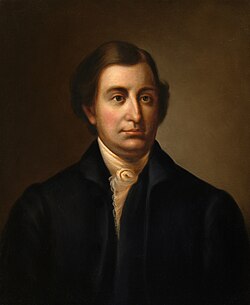Early Life
Edmund Jennings Randolph was born on August 10, 1753, in Williamsburg, Virginia, into a prominent family deeply involved in colonial politics. His father, John Randolph, served as the last King’s Attorney General of Virginia under British rule. Edmund attended the College of William and Mary, where he studied law under his father and his uncle, Peyton Randolph—a respected statesman and the first President of the Continental Congress.
At the outbreak of the Revolutionary War, Edmund broke with his loyalist father and chose to support the American cause. He joined General George Washington’s staff as an aide-de-camp in 1775, gaining early experience in both military and governmental affairs. While there is no firm evidence that he participated in the Siege of Boston, Randolph’s work with Washington provided him with a strong foundation for later public service.
Public Office
Randolph began his public service early, briefly serving as mayor of Williamsburg. In 1776, at the age of 23, he became Virginia’s first Attorney General under the new state government. He was elected to the Continental Congress in 1779 and again in 1781, during which time he became known for advocating a stronger, more effective national government.
In 1786, Randolph was elected Governor of Virginia, a position he held until 1788. As governor, he helped steer Virginia through the difficult post-war years, focusing on reorganizing the state’s economy and military. Although a supporter of independence and a critic of the Articles of Confederation’s weaknesses, Randolph remained cautious about overcentralization, a pragmatism that shaped his nuanced role at the Constitutional Convention.
Constitutional Convention
In 1787, Randolph was chosen to lead Virginia’s delegation to the Constitutional Convention in Philadelphia. On May 29, he presented the Virginia Plan, largely drafted by James Madison, which proposed a strong national government with three separate branches and a bicameral legislature. This plan became the starting point for the Convention’s deliberations and had a profound influence on the structure of the U.S. Constitution.
Despite his early leadership and critical contributions, Randolph ultimately chose not to sign the final draft of the Constitution. He expressed concerns that the proposed document lacked sufficient safeguards for individual liberties and did not yet include a bill of rights. His refusal reflected his deep belief in balancing federal power with protections for individual rights—a principle that he later saw addressed through the addition of the Bill of Rights.
Role in the New Government
Though he declined to sign the Constitution in 1787, Randolph supported its ratification in Virginia in 1788, after assurances were made that amendments (eventually the Bill of Rights) would be added.
In 1789, President George Washington appointed him as the first Attorney General of the United States. In this role, Randolph helped establish early interpretations of constitutional law and laid the groundwork for the federal legal system.
In 1794, he succeeded Thomas Jefferson as Secretary of State, becoming Washington’s principal advisor on foreign affairs. His tenure was marked by rising tensions between Britain and France, particularly regarding U.S. neutrality. In 1795, Randolph became embroiled in the so-called “French Dispatch Affair,” when intercepted French correspondence was interpreted—controversially—as evidence of disloyalty. Although no formal charges were ever brought and Randolph denied wrongdoing, the controversy led to his resignation.
Later Life
After leaving public office, Randolph resumed his legal practice in Virginia. He continued to be a significant figure in legal and constitutional affairs and helped shape Virginia’s judicial system. He also worked on a legal treatise—though it remained unpublished at his death.
In 1807, Randolph was part of Aaron Burr’s defense team during Burr’s trial for treason. The case was a landmark in early constitutional jurisprudence, and Randolph’s work helped define the high legal standard required for a conviction under the Constitution’s treason clause. Burr was ultimately acquitted.
Randolph remained active in legal and civic life until his death on September 12, 1813, at the age of 60.
Legacy
Though occasionally at odds with his contemporaries, Edmund J. Randolph played a crucial role in the founding of the United States. From proposing the Virginia Plan to serving in Washington’s cabinet, and later advocating for constitutional balance, his influence helped shape American governance. His complex but principled legacy underscores the careful balancing of liberty and order that defines the Constitution to this day.






